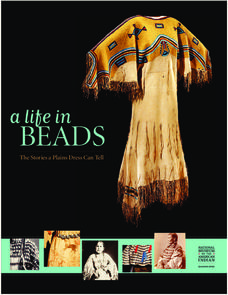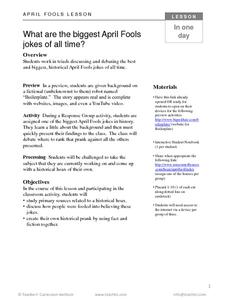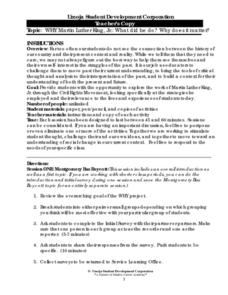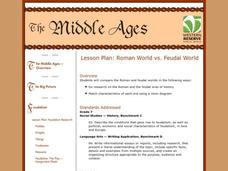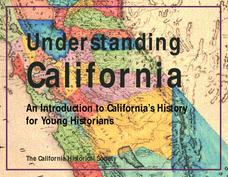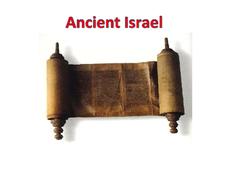Smithsonian Institution
A Life in Beads: The Stories a Plains Dress Can Tell
Young learners discover how the Sioux and Assiniboine tribes preserved native culture through the making of traditional dresses, identifying the resources used to make the dresses and discussing behind the meaning behind some American...
National Museum of the American Indian
The Kwakwaka'Wakw: A Study of a North Pacific Coast People and the Potlatch
Discover the cultural practices and unique value systems of a group of native peoples from Canada called the Kwakwaka'wakw. Your young historians will discuss how conceptions of wealth can vary and how these native people utilized...
TCI
What Are the Biggest April Fools Jokes of All Time?
After working in groups to analyze primary sources related to a historical hoax, learners will discuss how people managed to be fooled and work to identify one of the biggest April Fools jokes in history.
Scholastic
Harriet Tubman: Moses of Her People
Who was Harriet Tubman, and what was her place on the Underground Railroad? Recall the bravery and achievements of this extraordinary figure with a short, engaging informational text and crossword puzzle.
Crafting Freedom
The Self-Empowerment of Harriet Jacobs
In a hands-on learning activity, pupils read about and recreate the experience of Harriet Jacobs, author of one of the most famous slave narratives of all time in which she describes her years of hiding from her master in a confined...
Crafting Freedom
George Moses Horton: Slavery from a Poet's Perspective
Pupils have the unique opportunity to learn about the institution of slavery by reading first-hand experiences as described by George Moses Horton, the first slave to publish anti-slavery poetry.
Crafting Freedom
Creating Original Historical Fiction Using Henry "Box" Brown's Narrative and Runaway Slave Ads
Young historians discover the experiences of runaway slaves after reading the brief biography and narrative excerpt of Henry "Box" Brown, who escaped slavery by having himself shipped away in a crate and popularized his flight in a...
Crafting Freedom
F.E.W. Harper: Uplifted from the Shadows
Young historians discover the life of an incredible African American woman who, as an anti-slavery lecturer prior to the Civil War, defied stereotypes of what women could accomplish. Pupils explore the concept of stereotyping, read...
Umoja Student Development Corporation
Martin Luther King, Jr.: What Did He Do? Why Does It Matter?
Young historians examine the work of Martin Luther King Jr. by reading and answering questions about the Montgomery Bus Boycott, the Albany Movement, the Birmingham and Chicago campaigns, and the Memphis Sanitation Worker's Strike.
National Geographic
Mapping the Americas
Celebrate the geography of the Americas and develop map skills through a series of activities focused on the Western Hemisphere. Learners study everything from earthquakes and volcanoes of the Americas and the relationship between...
K12 Reader
Civil Rights Biography: Dr. Martin Luther King, Jr.
Why do schools and government offices close one day every January to honor the birthday of Dr. Martin Luther King, Jr.? Young learners discover the achievements and lasting significance of this influential figure in American history with...
Atlanta History Center
Civil Disobedience and the Atlanta Student Movement
What tactics are used in civil disobedience? Learners study the conditions in Alabama that led to the establishment of the Atlanta Student Movement, as well as consider the nature and effectiveness of civil disobedience.
TCI
Ain't I a Woman?
Learners discover the impact of women on civil rights in United States history by analyzing primary source clues to identify influential female figures.
National Gallery of Art
The First African American Regiment
Young historians examine a memorial sculpture of the first African American regiment in the Civil War, and then compare how the experiences of the regiment are portrayed in letters and poetry, as well as in the motion picture, Glory.
Northeastern Educational Television of Ohio, Inc.
Roman World vs. Feudal World
Young historians compare the major features of the Roman and feudal worlds, such as religion, social hierarchy, and political tenets, using online resources and group discussion.
Northeastern Educational Television of Ohio, Inc.
Feudalism Research
Working with a partner, young historians research different feudal roles in medieval Europe (i.e. nobles, knights, clergy, tradesmen, and peasants), create a fact sheet about their assigned roles, and present their findings to the class.
California Historical Society
Understanding California
Here is a beautiful handout through which learners can explore the history of California, from the earliest Europeans to visit the Golden State up through its experiences during the Great Depression and position in the modern world.
Mr. Arnayro
California Missions Project
Looking for alternative options to the traditional California missions project? This is the resource for you!
USA.gov
Three Branches of Government
Here is a very simple handout that illustrates how the Constitution provides for a separation of powers between the legislative, executive, and judicial branches.
North Carolina Consortium for Middle East Studies
Voices from the Trans‐Atlantic Slave Trade
Young historians trace the roots of African slavery and learn about the causes and effects of the Trans-Atlantic slave trade through a PowerPoint presentation and by reading and discussing excerpts from the book Copper Sun.
Curated OER
King David
Here is a quick instructional activity on King David, the second king of Israel. It discusses his famous contest with the Philistine warrior Goliath and is followed by a few reading comprehension questions.
Curated OER
Mesopotamia
Here is resource that offers a great, organized approach to your unit on Mesopotamia and early civilizations! As learners study the topics in the unit, such as the Fertile Crescent, ancient Sumeria, the Assyrian and Persian Empires, and...
Curated OER
Ancient Israelites Part 1
Young historians are given a thorough introduction to ancient Middle East geography and the patriarchs of ancient Israel with a PowerPoint presentation and supplemental worksheets. Topics covered include Abraham as the first patriarch,...
Art Institute of Chicago
African Myths and Stories
Young historians discover African stories associated with a royal altar tusk from the Kingdom of Benin in Nigeria, read myths illustrated on the tusk, and write a story about the life of an oba using figures depicted on the tusk.


